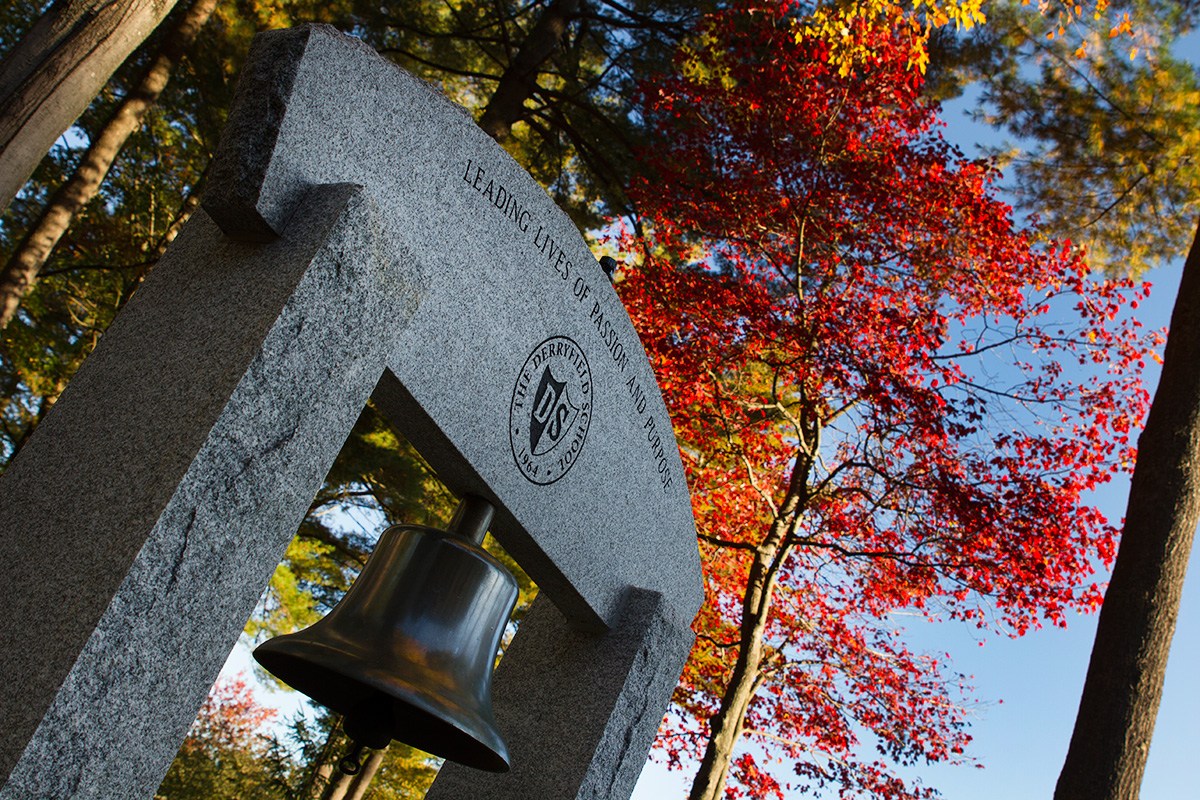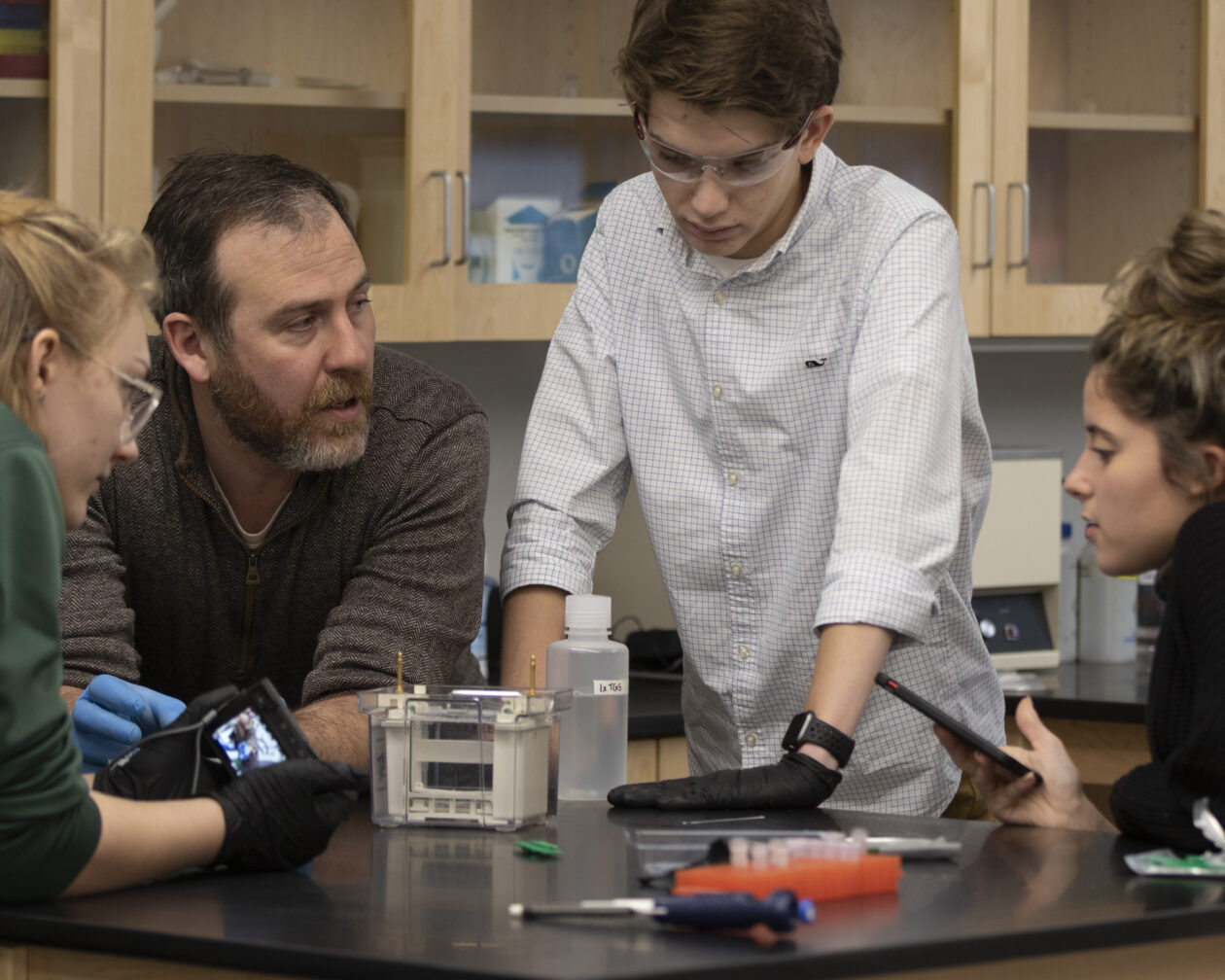Upper School Science
The Philosophy
Science education for our students provides them with science process skills, scientific concepts, and the resources necessary for the development of scientific literacy. The curriculum uses an inquiry-based approach appropriate for the developmental level of upper school students. The purpose of the curriculum is to encourage and develop an appreciation of science and the enjoyment of learning.
Biology (Year Long)
Open to: Grades 9 & 10
Biology allows students to explore the relationship between living things and their environment and teaches them how cells function. There is an emphasis on helping students become biologically literate through thoughtful experimental design and skill development for reading primary literature. Topics covered include evolution, ecology, basic biological chemistry, cell structure and function, metabolism, inheritance, molecular genetics, and plant anatomy. This course covers many topics at the surface level to give students an overview of diverse themes in biology and to offer exposure to a range of fields which could be pursued further in the future. A variety of assessments including laboratory investigations, projects, papers, quizzes, and debates assist students in understanding the major concepts being covered.
Biology Honors (Year Long)
Open to: Grades 9 & 10
Biology Honors takes a deep dive into biological concepts as they apply to all forms of life. Topics covered include evolution, basic biochemistry, cell structure and function, the cell cycle, energy processing through cellular respiration and photosynthesis, and information processing through DNA, RNA, and protein synthesis. Through a variety of activities, students will incorporate the scientific approach to question concepts and solve problems. Students will be introduced to primary scientific literature and will be expected to explore and interpret material independently and participate actively in class discussions on a daily basis. Success in this course will be evaluated, in part, by the extent that students apply what they know to solve new problems.
Chemistry (Year Long)
Open to: Grades 10 & 11
Chemistry introduces students to the relationships between the composition and structure of matter and the ways in which matter behaves. Students develop competency in and knowledge of the language of chemistry, the use of the periodic table, the properties of common substances, and the pattern and process of chemical reactions. The course emphasizes understanding reactions both theoretically as well as through classroom demonstrations and student laboratory work. A cumulative midyear assessment is given in January, and a final assessment is given at the end of the year.
Chemistry Honors (Year Long)
Open to: Grades 10 & 11
Chemistry Honors covers similar topics to Chemistry, but explores the material in greater depth, both conceptually and mathematically, and at a much faster pace. Chemistry Honors students must be able to quickly assimilate new knowledge, accessing additional support as needed. Additional topics of study include solution chemistry, properties of gasses, and acids and bases. The course emphasizes understanding reactions both theoretically as well as through classroom demonstrations and student laboratory work. Students complete one project each term that develops a deeper understanding of a specific aspect of chemistry. Cumulative assessments are given following the conclusion of each term.
STEAM Electives (for Science Department credit)
Open to: Grades 9-12
These trimester courses can be taken for Science credit. Please see the STEAM section of the Curriculum Guide for a complete description. Available courses include:
- STEAM: Engineering Design Process (F, S)
- STEAM: Engineering Alternative Energy (F)
- STEAM: 3D Design (W)
- STEAM: Construction and Architecture (W)
- STEAM: Landscape Design (S)
Physics (Year Long)
Open to: Grades 11 & 12
Prerequisite: Current enrollment in Algebra II or higher
From understanding how objects move to exploring the mysteries of electricity and magnetism, this course opens student’s eyes to the physics shaping our world. In the fall and winter, students learn to describe the motion of an object, and then apply Newton’s laws of motion and conservation of energy to the situation. In the spring, students explore the interaction between electric and magnetic fields and forces. Laboratory experiments and projects play a significant role in helping students develop their understanding of each concept. A mastery learning approach ensures students have the support and time to fully grasp each concept. With an emphasis on student-centered learning, this course balances conceptual understanding with practical math skills, ensuring everyone can succeed—whether you’re solving equations or simply exploring the “why” behind what you see everyday.
Physics Honors (Year Long)
Open to: Grades 11 & 12 (Grade 10 by permission of the Science Department)
Prerequisite: Current enrollment in Precalculus or higher.
Physics Honors offers a challenging and engaging exploration of the fundamental principles that govern the universe. This course moves beyond the topics covered in standard Physics, delving into advanced concepts like rotational motion and electrostatics, while also sharpening students’ mathematical and problem-solving skills. Laboratory experiments play a significant role in helping students develop their understanding of each concept. From homework assignments to laboratory experiments, students in Physics Honors are expected to solve more complex questions and problems. This higher expectation of work quality and depth of ideas directly challenges students’ conceptual understanding and mathematical skills. Students who can seamlessly apply geometry and algebra skills to problem-solving will have greater success in Physics Honors.
Environmental Science Fall: Water Resources (Embedded Honors Option) (F)
Open to: Grades 11 & 12
In the opening weeks of the term, students are introduced to a variety of current and historical perspectives on the environmental movement. From there, the focus shifts to the distribution and quality of water resources throughout the globe. Students collect and analyze freshwater from the Derryfield campus and also investigate how vegetation is influenced by human activities. For the final project, students create a digital poster to convey the major challenges and impacts of a specific water issue. Honors students are expected to read primary scientific literature and current events related to the course topics, and present their findings to the class.
Environmental Science Winter: Climate and Energy (Embedded Honors Option) (W)
Open to: Grades 11 & 12
Students begin the term modeling how turning on the lights in their home or classroom impacts the global air temperature. From there, students learn about the structure, composition, and role of Earth’s atmosphere, and how it has changed as a result of human influence. Students explore the origins and impacts of fossil fuels, greenhouse gasses, and different methods of generating electricity. Potential solutions or mitigation strategies for climate change are discussed. The term culminates in a student-designed climate action project, where students connect with the broader community to raise awareness and instigate change. Honors students are expected to read primary scientific literature and current events related to the course topics, and present their findings to the class.
Environmental Science Spring: Feeding the World (Embedded Honors Option) (S)
Open to: Grades 11 & 12
As our global population approaches 8 billion, the need for food and land resources has also grown. In this term, students will consider the distribution of food resources across the globe, compare and contrast commercial and sustainable agriculture practices, and discuss the impact of food choices on the environment. Juniors in this course will develop and carry out a group project during the final weeks of the term to address a local environmental challenge of their choice. Honors students are expected to read primary scientific literature and current events related to the course topics, and present their findings to the class.
Anatomy and Physiology (Year Long)
Open to: Grades 11 & 12
Prerequisites: Biology and Chemistry
This course is designed to provide an in-depth exploration of the intricacies of the human body’s structure and function. Through a combination of theoretical study and hands-on laboratory experiences, this course aims to offer an advanced understanding of human anatomy and physiology. Students enrolled in this course will explore an extensive range of topics, including, but not limited to, tissues and organs, the musculoskeletal system, the cardiovascular system, the respiratory system, the nervous system, and the digestive system. Throughout the course, students will engage in laboratory experiments, anatomical dissections, hands-on activities, and research projects to deepen their understanding and practical application of these systems.
Advanced Topics Science: Anatomy and Physiology (Year Long)
Open to: Grades 11 & 12
Prerequisites: Biology and Chemistry
The Advanced Topics Anatomy and Physiology course provides an in-depth study of the human body’s structure and function. The curriculum mimics introductory college-level pre-med courses, emphasizing critical thinking, laboratory investigations, and applied knowledge. Students will explore the body’s systems, pathophysiology, and medical applications. This advanced course covers an extensive range of body systems. Each system is examined in detail to understand its components, interactions, and role in maintaining homeostasis. The course provides an in-depth study of cell structure, function, and disease mechanisms. This AT course is distinguished by its rigor, breadth, and depth. Advanced topics such as medical terminology and pathology equip students with a foundation for future studies in medicine or related fields. The course culminates in a capstone project, requiring students to integrate knowledge of multiple systems and apply their understanding to real-world medical scenarios. Through this comprehensive project, students will refine their research and analytical skills while demonstrating mastery of the course material.
Advanced Topics Science: Biology (Year Long)
Open to: Grades 11 & 12
Prerequisites: Biology and Chemistry
The Advanced Topics Biology course is a capstone course for the biology curriculum at Derryfield. This course is comparable to a first-year biology course at the college level. This course is open to all students who did high quality work in Biology and Chemistry (honors and non-honors), and have outstanding motivation and interest in molecular biology. Successful students in this class will be those who have developed responsibility for their own learning.
As part of the biotechnology lab skills component of AT Biology, students complete a series of industry-relevant lab investigations ranging in complexity from DNA extraction to gene editing of bacteria using CRISPR technology. This section of the course is approximately 75% lab based, with the remainder spent discussing concepts, techniques, and ethics related to the use of biotechnology. Throughout the course, students learn to decode technical language in primary scientific literature. In the immunology and microbiology portion of this course, students gain a basic understanding of immune cell types and a range of pathogens. Students participate in group and individual projects utilizing creative as well as scientific approaches to diseases. Specifically, students investigate functions of monoclonal antibodies and develop a novel therapeutic approach for this technology. The project culminates in a formal scientific presentation to a group of industry professionals in addition to their peers and other Derryfield teachers. Students also explore the role of ethics and equity in scientific research.
Advanced Topics Science: Chemistry (Year Long)
Open to: Grades 11 & 12
Prerequisites: Biology and Chemistry
The Advanced Topics Chemistry course is a capstone course for the chemistry curriculum at Derryfield. The course is open to all students who did high quality work in Chemistry or Chemistry Honors and have outstanding motivation and interest in chemistry or the field of science. Successful students in this class will be those who have developed responsibility for their own learning, have mastered the basics of stoichiometry and chemical bonding, and have a curiosity and drive to understand deeper and more subtle chemical questions. AT Chemistry covers selected topics with greater depth and detail, both conceptually and mathematically, including stoichiometry, nuclear chemistry, reaction kinetics, equilibrium, acid/base chemistry, and electrochemistry. Laboratory experiences are similar to those in a first-year college course. In the winter term, students take a deep dive into a specific aspect of nuclear chemistry, interviewing experts in the field and creating a podcast to educate the public about their topic.
Advanced Topics Science: Physics (Year Long)
Open to: Grades 11 & 12
Prerequisites: Physics, current enrollment in AT Calculus I or higher
The Advanced Topics Physics course is a capstone course for the physics curriculum at Derryfield, and is designed for students ready for college-level challenges. The course builds on material covered in the Physics Honors and Physics courses by introducing calculus solutions to previous topics. The course focuses on mechanics, electricity and magnetism, and then moves onto other topics like thermodynamics and fluid mechanics. AT Physics utilizes open-ended laboratory experiments and real-life application projects, requiring students to think critically, test hypotheses, and develop creative solutions to complex problems. In a student-centered environment, AT Physics students showcase mastery of physics in innovative ways, building essential skills like collaboration, problem-solving, and scientific communication.





